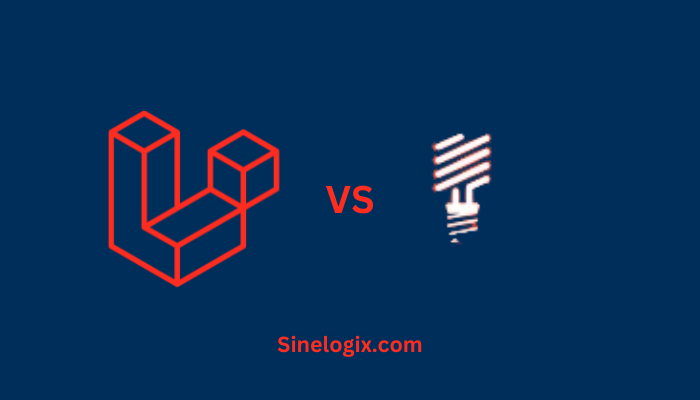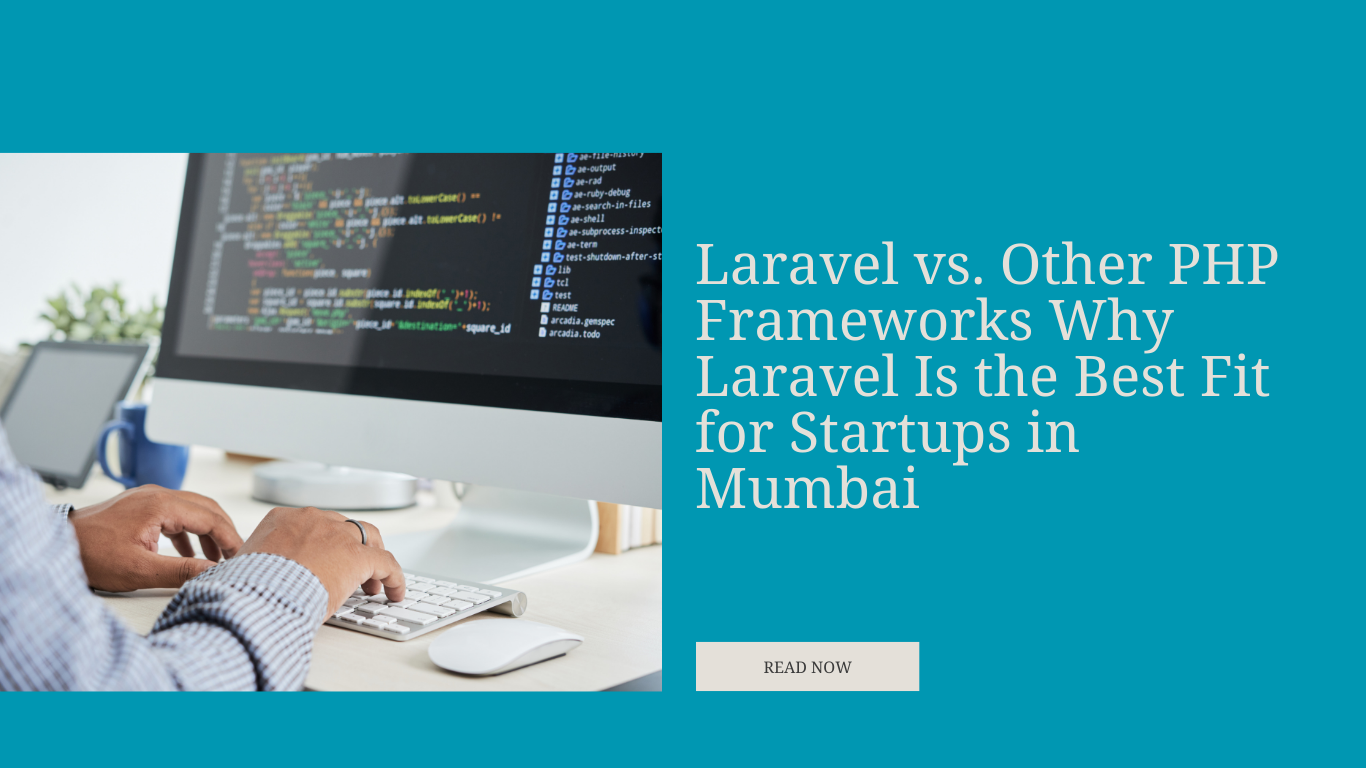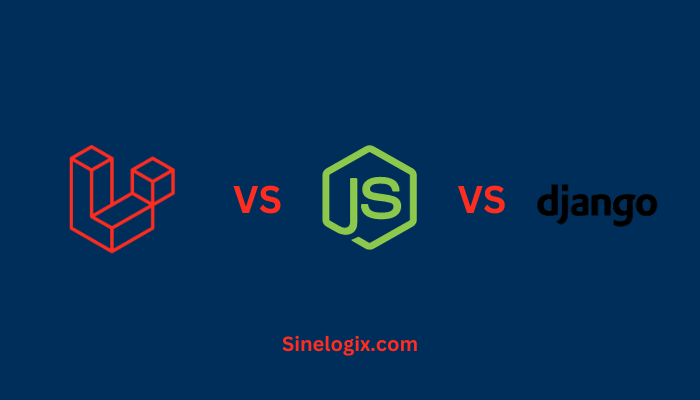In the realm of PHP web development, choosing the right framework lays the groundwork for a project’s success. Laravel and Lumen, both developed by Taylor Otwell, emerge as prominent players, each tailored to specific needs.
In this exploration, we’ll dissect the strengths, weaknesses, and nuances of Laravel and its micro-framework counterpart, Lumen, to guide developers in making informed decisions for their web applications.
Overview of Laravel and Lumen
Laravel: Renowned for its expressive syntax and developer-friendly features, Laravel is a full-stack PHP framework following the MVC (Model-View-Controller) pattern. It offers a comprehensive ecosystem, including an elegant ORM (Object-Relational Mapping) system, Blade templating engine, and tools for tasks like routing, authentication, and testing. Laravel prioritizes rapid development without compromising scalability and maintainability.
Lumen: Lumen, a lightweight and micro-framework sibling of Laravel, is tailored for building microservices and smaller, performance-oriented applications. Inheriting the elegance and simplicity of Laravel, Lumen strips away certain features to prioritize speed and efficiency. It is ideal for projects where a minimalistic footprint and high performance are crucial.
Language and Ecosystem
Laravel: Built on PHP, Laravel leverages the widely-used server-side scripting language. Its ecosystem includes Composer for package management, offering a vast array of libraries and tools that seamlessly integrate with Laravel projects. The availability of third-party packages enhances Laravel’s extensibility and versatility.
Lumen: As a micro-framework, Lumen also leverages PHP, inheriting the language’s simplicity and flexibility. While its ecosystem is more streamlined compared to Laravel, Lumen integrates with Composer, allowing developers to include specific components as needed. Lumen’s focus on minimalism ensures a lightweight footprint.
Architecture and Design Philosophy
Laravel: Laravel embraces the MVC architecture, encouraging a clean separation of concerns and facilitating code organization. It follows an opinionated approach, providing conventions that enhance developer productivity. Laravel’s design philosophy prioritizes expressive syntax, developer happiness, and the creation of elegant and maintainable code.
Lumen: Lumen adheres to the same MVC architecture as Laravel but adopts a more minimalistic and unopinionated approach. The framework provides essential components for building web applications without enforcing rigid conventions. Lumen’s design philosophy aligns with simplicity, making it a favorable choice for microservices and projects where a lightweight structure is essential.
Learning Curve and Documentation
Laravel: With a moderate learning curve, Laravel is accessible for developers familiar with PHP. Its documentation is comprehensive, offering guides, API references, and tutorials. Laravel’s extensive resources, including Laracasts and a vibrant community, contribute to a supportive learning environment.
Lumen: Lumen’s learning curve is generally lower than Laravel’s, making it approachable for developers with basic PHP knowledge. The documentation provides concise information on the framework’s features, and developers experienced with Laravel will find many concepts familiar in Lumen.
Community and Support
Laravel: Boasting a large and active community, Laravel provides a wealth of resources, forums, and third-party packages. The community actively contributes to Laravel’s growth and improvement, ensuring continuous support and updates. Laravel’s popularity translates into a robust ecosystem and widespread community engagement.
Lumen: While not as extensive as Laravel’s, Lumen has a dedicated community focused on microservices and lightweight applications. The community actively supports Lumen’s development, contributing to its stability and responsiveness. Lumen’s niche appeal attracts developers seeking the specific advantages it offers.
Performance and Scalability
Laravel: Laravel, optimized for developer productivity, provides good performance and scalability. It offers features like caching, queuing, and optimized database queries to enhance scalability. Laravel Horizon, a dashboard and queue manager, aids in efficiently managing scalable applications.
Lumen: Built for speed, Lumen excels in terms of performance, making it an ideal choice for microservices and projects where rapid execution is paramount. Its lightweight nature and minimalistic features contribute to enhanced performance, although certain Laravel features are sacrificed for this speed.
Middleware and Request Handling
Laravel: Laravel’s middleware system provides a flexible mechanism for filtering HTTP requests. Developers can use middleware to perform tasks like authentication, logging, and modifying incoming requests. This feature enhances Laravel’s ability to handle various aspects of request processing.
Lumen: Lumen also incorporates a middleware system, inheriting the capability from Laravel. However, due to its minimalistic nature, Lumen’s middleware is optimized for speed, making it a streamlined solution for handling HTTP requests efficiently.
Database Integration and ORM
Laravel: Laravel’s Eloquent ORM simplifies database operations with an expressive syntax. It allows developers to interact with databases using object-oriented methods, making it easy to perform common tasks like querying and updating records. Laravel’s database migration system further streamlines schema management.
Lumen: Lumen’s ORM capabilities, while less feature-rich than Laravel’s, provide essential functionality for database interactions. Lumen’s lightweight nature aligns well with microservices and projects where a more minimalistic approach to ORM is sufficient.
Template Engine
Laravel: Laravel employs the Blade templating engine, known for its simplicity and readability. Blade supports template inheritance and allows developers to create modular and reusable views. Laravel’s approach to templating contributes to the framework’s focus on clean and maintainable code.
Lumen: Lumen uses the same Blade templating engine as Laravel, ensuring consistency in syntax and features. Developers familiar with Blade in Laravel can seamlessly transition to Lumen, leveraging the same templating advantages in a more lightweight framework.
Testing and Quality Assurance
Laravel: Laravel places a strong emphasis on testing with PHPUnit, providing a robust testing environment out of the box. Developers can conduct various types of tests, including unit tests, feature tests, and integration tests seamlessly. Laravel Dusk, a testing tool, facilitates browser automation testing, ensuring comprehensive coverage for web applications. The framework’s commitment to testing contributes to the overall quality and stability of Laravel applications.
Lumen: While Lumen inherits some of Laravel’s testing capabilities, it is designed with a more lightweight footprint. Lumen applications can still be thoroughly tested using PHPUnit, but developers may find fewer built-in testing features compared to Laravel. The trade-off for Lumen’s speed and efficiency may mean relying more on external testing libraries and tools.
Development Speed and Prototyping
Laravel: Laravel’s elegant syntax and built-in features like Eloquent ORM and Blade templating engine contribute to rapid development. Laravel Spark, a package for SaaS application scaffolding, accelerates the creation of subscription-based web applications. The framework’s focus on developer-friendly syntax and conventions aids in quick prototyping, making it ideal for startups and projects with tight deadlines.
Lumen: Lumen’s emphasis on speed makes it well-suited for rapid development, especially for microservices and small-scale applications. While not as feature-rich in terms of scaffolding tools as Laravel, Lumen provides a solid foundation for quick prototyping. Its lightweight nature allows for efficient development, catering to projects with a need for swift execution.
Mobile App Development
Laravel: While Laravel is primarily a backend framework, it can be used in conjunction with technologies like Laravel Nova or API resources to serve as the backend for mobile applications. Laravel’s API-centric approach facilitates the development of robust and secure APIs, making it a viable choice for projects involving mobile app integration.
Lumen: Similarly, Lumen can serve as a backend for mobile applications, leveraging its lightweight architecture for efficient API development. When paired with frontend frameworks like React Native or Flutter, Lumen contributes to building comprehensive and high-performance mobile app solutions. Its speed-focused design aligns well with the demands of mobile development.
Community Trends and Adoption
Laravel: The Laravel community is dynamic, and the framework continues to evolve with frequent updates and new features. Laravel Vapor, a serverless deployment platform, reflects the community’s commitment to embracing modern cloud-native technologies. This adaptability ensures that Laravel remains relevant in the ever-changing landscape of web development.
Lumen: While not as widely adopted as Laravel, Lumen has a dedicated user base, particularly among developers working on microservices and smaller projects. The community-driven development ensures that Lumen receives support and updates, maintaining its relevance in the niche it serves.
Server Resource Utilization
Laravel: Being an interpreted PHP framework, Laravel typically requires more server resources compared to frameworks written in lower-level languages. However, the ease of use, extensive feature set, and developer-friendly environment can justify the resource overhead in many scenarios.
Lumen: Lumen’s design prioritizes efficiency, resulting in lower server resource utilization compared to Laravel. Its minimalistic features and lightweight architecture contribute to faster response times and efficient resource usage, making Lumen a suitable choice for projects with a focus on optimization.
Ecosystem and Third-Party Integrations
Laravel: Laravel’s ecosystem is rich and diverse, with a wide array of third-party packages available through Composer. Laravel Forge simplifies server provisioning and deployment, while tools like Laravel Mix streamline asset compilation. The availability of packages and integrations enhances the development workflow and supports a variety of use cases.
Lumen: While Lumen’s ecosystem may not be as extensive as Laravel’s, it provides essential tools and components needed for web development. Lumen’s focus on a more lightweight architecture doesn’t limit its ability to integrate third-party libraries seamlessly. However, developers may need to implement custom solutions for specific requirements due to the framework’s minimalistic approach.
Containerization and Microservices
Laravel: Laravel applications can be containerized using tools like Docker, allowing for seamless deployment and scalability. Laravel’s modular structure and support for microservices architectures make it suitable for building distributed systems. Laravel Horizon, a dashboard and queue manager, aids in managing scalable Laravel applications efficiently.
Lumen: Lumen, being a micro-framework, is inherently designed for microservices architectures. Developers can containerize Lumen applications to achieve efficient deployment and scaling. Lumen’s lightweight nature aligns with the resource-efficient requirements often associated with microservices.
Internationalization and Localization:
Laravel: Laravel provides robust support for internationalization and localization. Developers can easily manage language files, translate content, and adapt the application to different locales. Laravel’s localization capabilities contribute to building globally accessible web applications, a crucial aspect for projects targeting diverse audiences.
Lumen: Phalcon also supports internationalization and localization through its translation features. Developers can manage translations to provide multilingual support in Phalcon applications. While not as feature-rich as Laravel in this aspect, Phalcon’s localization capabilities cater to projects with global audiences.
User Authentication and Authorization
Laravel: Laravel simplifies user authentication and authorization through the built-in Laravel Passport and Laravel Sanctum packages. These packages provide convenient solutions for API authentication and token management. Laravel’s focus on security features ensures a robust foundation for implementing user authentication and access control.
Lumen: Lumen offers user authentication features that developers can leverage to implement secure login and registration processes. While not as extensive as Laravel’s Passport and Sanctum, Lumen’s authentication capabilities provide the essential functionality needed for securing web applications.
SEO-Friendly Routing and URLs
Laravel: Laravel’s routing system allows developers to create clean, SEO-friendly URLs. The framework’s expressive routing syntax and the ability to define named routes contribute to building URLs that are both human-readable and optimized for search engines. Laravel’s approach to routing enhances the overall SEO performance of applications.
Lumen: Lumen’s routing system also supports the creation of SEO-friendly URLs. Developers can define routes in a way that aligns with best practices for search engine optimization. While not as feature-rich as Laravel’s routing, Lumen provides the necessary tools for crafting clean and user-friendly URLs.
Related Articles:
Conclusion
The decision between Laravel and Lumen extends beyond syntax preferences and involves a holistic evaluation of various factors. From testing and prototyping to mobile app development and server resource utilization, developers must consider the specific requirements and constraints of their projects




